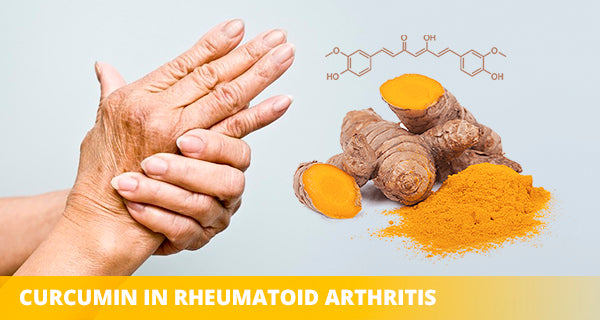Curcumin in Rheumatoid Arthritis (SQ-122)
RA causes chronic inflammation in joints and is accompanied with redness, pain and swelling. The ongoing inflammation leads to gradual destruction of the bone and cartilage. The most commonly affected joints are those of the knees, ankles, feet, hands, wrists and elbows.
Symptoms of Rheumatoid Arthritis
- Swelling and pain in joints
- Stiffness in joints, that is worse in mornings and after periods of inactivity
- Reduced mobility of the affected parts
- Joint deformity
- Fever, fatigue and loss of appetite
- Dry mouth and eyes
People with rheumatoid arthritis are also more likely to develop osteoarthritis, nodules, infections, heart and lung problems and even lymphoma.
What causes Rheumatoid Arthritis?
Scientists don’t yet fully understand what causes rheumatoid arthritis but it is believed that certain factors may trigger the disease development, including family history, certain viral or bacterial infections, obesity and environmental factors such as exposure to silica, mineral oil, smoking and other pollutants. Women are at an increased risk of developing RA than men.
Typical treatment to manage RA symptoms involves use of anti-inflammatory drugs (NSAIDs), oral or intra-articular glucocorticoids or disease modifying antirheumatic drugs (DMARD). However, regular, chronic use of NSAIDs and other drugs are known to cause serious side-effects such as gastrointestinal bleeding, ulcers, liver damage, kidney damage and increased risk of infections, unhealthy blood pressure issues and heart problems.
Considering RA is a chronic condition that requires ongoing medication, these risks can’t be ignored if you are going to use these drugs for a long period of time. Patients as well as healthcare experts are increasingly looking for safer and more effective ways to manage the symptoms. And curcumin is fast emerging as an option to effectively manage pain and inflammation in rheumatoid arthritis without significant adverse side effects. Let’s see how it helps.
How Curcumin May Help in Rheumatoid Arthritis
Studies show that curcumin, the active ingredient in the curry spice turmeric, has powerful anti-inflammatory, pain-relieving and antioxidant properties.
1. Lowers inflammation
It is well established that certain molecules such as cytokines and enzymes are involved in the process of chronic joint inflammation and destruction in cartilage and bone associated with RA. Curcumin blocks both the synthesis and activity of these pro-inflammatory molecules. [1]
Does it work more effectively than drugs? A small 2012 study showed that curcumin supplements were far more effective in reducing joint tenderness and swelling than diclofenac, an anti-inflammatory drug. Researchers concluded that the curcumin group showed the highest percentage of improvement over the patients who were given diclofenac sodium. The curcumin group had another very important benefit – lack of any adverse side effects. Not one person in the curcumin group withdrew from the study because of side effects, compared with 15 percent in the NSAID group, who dropped out because of adverse effects or intolerance.
The researchers further noted that, “More importantly, curcumin treatment was found to be safe and did not relate with any adverse events. Our study provides the first evidence for the safety and superiority of curcumin treatment in patients with active RA, and highlights the need for future large-scale trials to validate these findings in patients with RA and other arthritic conditions." [2]. Although the findings are exciting, it is important to note that long term human studies in a larger population are still required to establish these health benefits.
2. Reduces pain
Joint pain is one of the most frequent and limiting symptoms in people affected with RA. Dealing with pain can take a huge toll on the quality of life, making life miserable in many aspects. In addition, living with unchecked chronic pain causes stress that negatively impacts the immune system, creating a vicious cycle of added inflammation and flare-ups. Since the primary cause of this pain is inflammation, curcumin provides pain relief through its anti-inflammatory mechanism.
3. Lowers oxidative stress
Curcumin shows remarkable antioxidant activity, and works as a strong free radical scavenger. Free radicals are highly reactive species known to cause oxidative stress and trigger inflammation. These unstable molecules with an unpaired electron damage tissues like synovium and contribute to all kinds of chronic, degenerative disorders including inflammatory joint disease.
A study suggested that “oxidative stress generated in an inflamed joint can contribute to autoimmune phenomenon and connective tissue destruction in RA. New therapeutic protocols based on correcting oxidative stress levels may prove effective in restricting disease progression and limiting deformities.” [3]
In addition, curcumin may also help in limiting production of free radicals and oxidative stress caused by NSAIDs and DMARD, thus preventing damage to stomach lining and the formation of ulcers.
If you’re battling the debilitating symptoms of RA, and have difficulty taking NSAIDs, it might be time to try curcumin supplements. However, experts recommend not to completely give up your conventional medications but to start curcumin as an adjunct therapy. People with bile duct dysfunction or pregnant women should avoid taking curcumin. It can also interfere with some prescription drugs. Always talk to your doctor before taking curcumin supplements if you are on blood thinners or taking medicines for diabetes.
References:
- Binu Chandran, Ajay Goel. A Randomized, Pilot Study to Assess the Efficacy and Safety of Curcumin in Patients with Active Rheumatoid Arthritis. Phytotherapy Research. 2012
- Funk et al. Efficacy and mechanism of action of turmeric supplements in the treatment of experimental arthritis. Arthritis Rheum. 2006
- Bhowmick et al. Free radical and antioxidant status in rheumatoid arthritis. Indian Journal of Rheumatology. 2008


